Adams: Doctor Atomic
Introduction
The American minimalist movement has now apparently become post-minimalist, which I am assuming is less minimal than it used to be...
Anyway, John Adams is arguably the master of the style, and has never been one to shirk his artistic responsibility in using worthwhile subjects for his music. Operas such as Nixon in China and The Death of Klinghoffer have been hugely successful (if not a little controversial), but it shows that he likes to take a snapshot of important developments in recent history and create a work that delves into the reasons behind each event in a way that TV and film cannot.
Here, we have the 24 hours (or so) before the first nuclear explosion in Los Alamos, New Mexico, and we are invited to witness the panicked preparations of the characters involved, experiencing their innermost thoughts and hearing many of the words actually spoken at the time.
Of course, general conversation about anything isn't particularly interesting, and doesn't really lend itself to an effective libretto, but when the subject discussed is the most far-reaching event of the twentieth century, the effects of which will be with us for good, then there is something to work with.
The major players are Robert Oppenheiner, the chief scientist overseeing the 'Manhattan' project; General Leslie Groves, the bombastic, arrogant and quite ruthless military chief; Edward Teller, the brilliant physicist who became known as the 'father of the hydrogen bomb', and may have been an inspiration for the character of 'Dr Strangelove'; Jack Hubbard, the chief meteorologist, who is unable to predict good weather in the time expected by the military; and Kitty Oppenheimer, the wife, who is seen as the stabilising influence in Oppenheimer's life, yet receives little in return.
All are equally important in this work.
Video
Very good indeed, with no noticeable problems, even with what seems like deliberate focussing issues - purely for artistic reasons I'm sure. Close-ups are incredibly clear, and create an almost claustrophobic feeling at times, and with the fine acting on stage, create a tangible sense of fear and uncertainty - which, considering some thought the explosion could possibly create some sort of chain reaction throughout the Earth's atmosphere, is quite understandable.
Audio
Fantastic sound throughout, with incredible balance between the stage and a huge orchestra. This may have been helped by the fact that many of the characters have microphones strapped to their faces, but I can't be sure that some form of amplification may not have been used for the benefit of the audience. Either way, it's very effective.
Extras
Not a bad selection, with some 'mini-documentaries' (at around 5 minutes each) focussing on the opera itself, the cast, the composer and the director. In these, we get some quite interesting snippets of information from all those involved, but it's shame that John Adams is not given as much time as Peter Sellars (who also has a 27 minute chat on the side). All in all though, a good mix.
Conclusion
There are two other important characters in this work which I didn't mention earlier. Pasqualita (beautifully sung by Ellen Rabiner), the Mexican nanny for the Oppenheimers but whose words also turn her into some form of 'Earth Mother', and the bomb itself, which hovers over the action constantly drawing our, and the characters', attention towards it. The feeling created is one of almost divine significance, and the use of ancient Indian texts is not lost on the audience, especially as Oppenheimer himself said that the line from the Bhagavd Gita, "I am become Death, the destroyer of worlds", came to him when watching the explosion.
Interestingly, Kenneth Bainbridge, the Test Director descibed it as "a foul and awesome display", and told Oppenheimer immediately after the test, "Now we are all sons of bitches"...but the Sanskrit sounded better, and Bainbridge doesn't feature in the opera anyway.
Poetry is used throughout Sellars' libretto, mixed with the actual conversations had at the time. This seems to reflect the love of poetry which Oppenheimer obviously had (making love to his wife by quoting Baudelaire is classy, but not exactly what she wants) and adds a sense of humanity to the horror they were all about to unleash on the world.
Oppenheimer himself (performed brilliantly by Gerald Finley) is shown as a troubled but determined man, who seems to understand exactly what he is about to do, but will not be swayed by political or social pressure. The 'gadget', despite being held together by fairly cheap materials and a pile of sticky tape (which, apparently, it was) becomes an object of worship that almost communicates with him and, like any deity worth its salt, takes over his whole life.
Jessica Rivera (Kitty) is outstanding as the wife and mother, who is trying to bring her husband back to the family, and who attempts to reconcile the fact that they are bringing up a young life, while preparing to destroy thousands of others. She has some particularly difficult music to carry off, but does it stunningly.
General Groves (Eric Owens) and Jack Hubbard (James Maddalena - a Sellars production regular) make a great 'team'. Their shouting matches about weather forecasts could seem almost comedic if it wasn't for the seriousness of the situation. The time set for the explosion was in the middle of a violent electrical storm, and Hubbard's refusal to commit to predicting any form of fair weather riles Groves up so much, that the General decides to do his own forecast.
Here, Adams' music has developed away from the more hypnotic style of work such as Nixon in China, and can perhaps seem a little too much like a film soundtrack, but the excitement and tension is constant, and the writing for the orchestra is exceptional. The orchestra itself plays everything with a great sense of purpose (some blinding trumpet playing) and it's all whipped along at a decent pace by Lawrence Renes.
The vocal lines are probably not as memorable as in some of his works, but are successful in creating a believable conversational rhythm, despite some of Sellars' more opaque sections of the libretto. The final chorus, 'At the sight of this' , is a bit of a let down (the rest of the chorus numbers are excellent), again because of Sellars' text, and some silly choreography.
Talking of choreography, the sight of soldiers and others prancing across the stage adds little to the effect of the piece and could really have been left out.
Despite being a live performance, the cameras are used very creatively and judging by the director's van outside, they had several to manipulate. The overall result removes us from the theatre and creates a very effective film.
One of the questions Adams and Sellars needed to answer was how, or rather if, they were going to try and recreate a nuclear explosion. It was obviously not going to happen, however artistically done, and so everything from the moment of the first test to the bomb exploding over Hiroshima is left to the imagination using effective lighting, movement, gripping music and most chilling of all, a recorded voice of a Japanese woman asking for water, and calling her little boy over to her.
The story of 'Trinity' and the subsequent bombing of Japan will never fail to grab our attention. Whether it should have been done is always going to be a moot point, but after watching this, you are left in no doubt on which side of the fence Adams and Sellars have placed themselves. A performance as good as this can have a profound effect.
English National Opera are performing the work at the beginning of 2009, with Finley and Rivera recreating their respective roles, and Renes in the pit. It's a different production (by Penny Woolcock) but I'm still going to make a concerted effort to see it live - and hopefully I can answer the question about the microphones, should they be used.
Until then, this DVD will get a few more outings. It's a great addition to the operatic catalogue in general, one of Opus Arte's best, and very highly recommended.
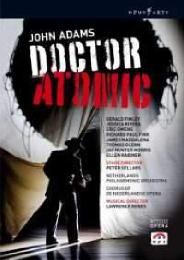
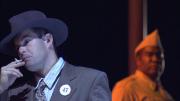
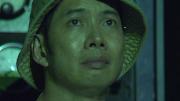
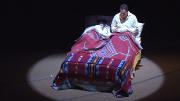

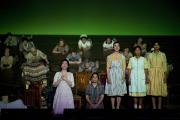
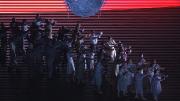
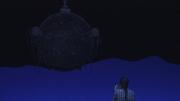
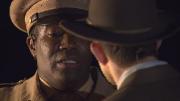

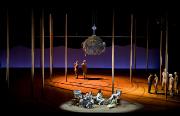





































Your Opinions and Comments
Be the first to post a comment!